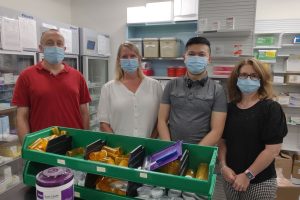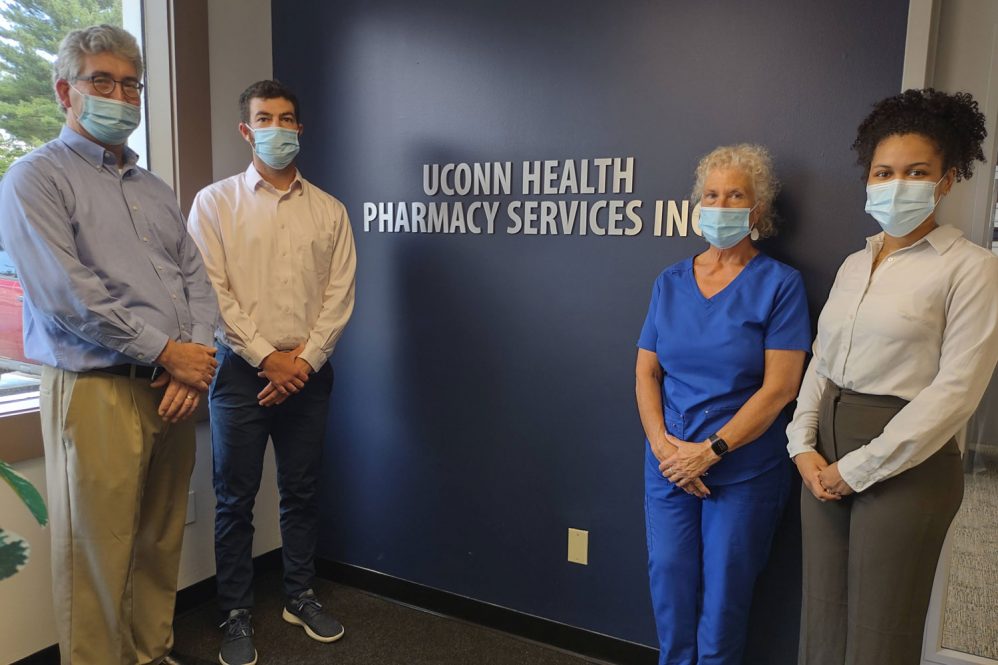The pharmacy changes lives daily and has secured over $17 million in financial assistance for our patients since its opening.
— Kim Metcalf
The specialty pharmacy at UConn Health is quietly marking a milestone — two years of simplifying the process of getting specialty medications to patients that saves them time, aggravation, and money.
It was June 30, 2020, still early in the pandemic, when the specialty pharmacy opened and filled a single prescription on its first day. Two years later, a typical month for UConn Health Pharmacy Services Incorporated is 900 patients served and 1,100 prescriptions filled.
“We’ve had tremendous growth,” says Emmett Sullivan, the specialty pharmacy manager. “In the past year, we’ve doubled our staff and our volumes doubled as well.”

By the end of its first year, the specialty pharmacy had attained the industry’s highest level of accreditations.
“Our success has a lot to do with our personalized patient-centered dedicated service that is integrated into the clinic model,” says Kim Metcalf, associate vice president for pharmacy and ancillary services. “The pharmacy changes lives daily and has secured over $17 million in financial assistance for our patients since its opening. Our pharmacy exceeds the national average in the time to receive specialty medications to an average of 2 ½ days, as compared to other national specialty pharmacies which achieve access in 7 to 10 days.”
Specialty drugs often have one or more of the following characteristics:
- They’re not widely used, therefore they’re handled through limited distribution channels.
- They’re more likely to have interactions with other medications.
- They may have side effects that the patient needs to recognize and communicate to the health care team.
- They usually are very high-cost, in some cases as much as $500,000 per year. They include oral, injectable, and biologic medications, treating cancer, hepatitis, auto-immune conditions and other rare or chronic conditions.
Integrating a specialty pharmacy with patient care at UConn Health offers patients with conditions that require specific — usually high-cost — pharmaceuticals, more coordinated and often less expensive care.
“The specialty pharmacy takes a complex process and decreases the stress for patients so they can focus on their health,” Sullivan says. “If you get a specialty prescription written by your provider and walk into the local pharmacy, it probably wouldn’t be available, and if it was, the cost of the medication could be hundreds if not thousands of dollars for the copay.”
Any copay that comes back at more than $10, our team is looking for alternative ways to lower that cost to the patient further.
— Emmett Sullivan
With its dual accreditation with URAC (originally the Utilization Review Accreditation Commission) and ACHC (Accreditation Commission for Health Care), the specialty pharmacy has greater access to these medications. The clinical staff works directly with the providers to add an additional level of review.
Pharmacy liaisons help patients to minimize out-of-pocket expenses and navigate their additional options beyond what insurance will cover. The pharmacy team engages the patients and increases the medication adherence rates to nearly 90%, well above the national standard of 80%.
“The financial barriers are a common cause for lower adherence,” Sullivan says. “Any copay that comes back at more than $10, our team is looking for alternative ways to lower that cost to the patient further. The manufacturer may have a copay assistance card, or there may be grants for certain conditions that the liaisons will research and watch out for.”
Before the specialty pharmacy opened, a patient in need of a specialty medication faced several potential obstacles and delays of two weeks or more. The retail pharmacy may not have the medication. The insurance often will reject these claims, which needs additional information from the health care team. It could get routed back to the insurance plan’s mail-order specialty pharmacy and be filled in another state, and the patient would have to wait for it to arrive in the mail, in refrigerated conditions if applicable.
“We’re right here in Farmington and we deliver it right to your door anywhere in the state,” Sullivan says. “It’s monitored for temperature sensitivity, and you’re going to get your medication, refrigerated, to your house or to your office. Our average time from getting an order in to getting it out is a third of the national average.”
Patients also get help with prior authorization from their health insurer, refill reminder calls, keeping their providers updated, and understanding the purpose, dosage, potential side effects of the medications and potential drug interactions.
Although UConn Health’s specialty pharmacy has come a long way in its two years, the plan is to continue on that growth trajectory and expand into clinical areas it hasn’t fully engaged with yet.
“Our approach of personalized care has led to better patient care and outcomes,” Metcalf says. “Our pharmacy continues to exceed expectations, and our plans for growth this next year look very bright.”
Learn more about UConn Health Pharmacy Services Incorporated.



